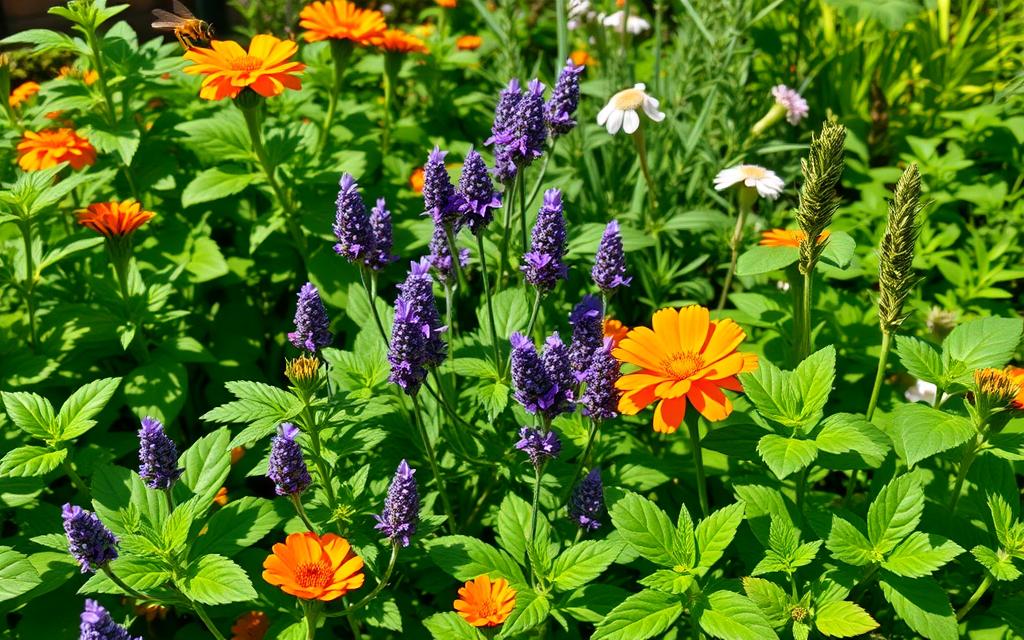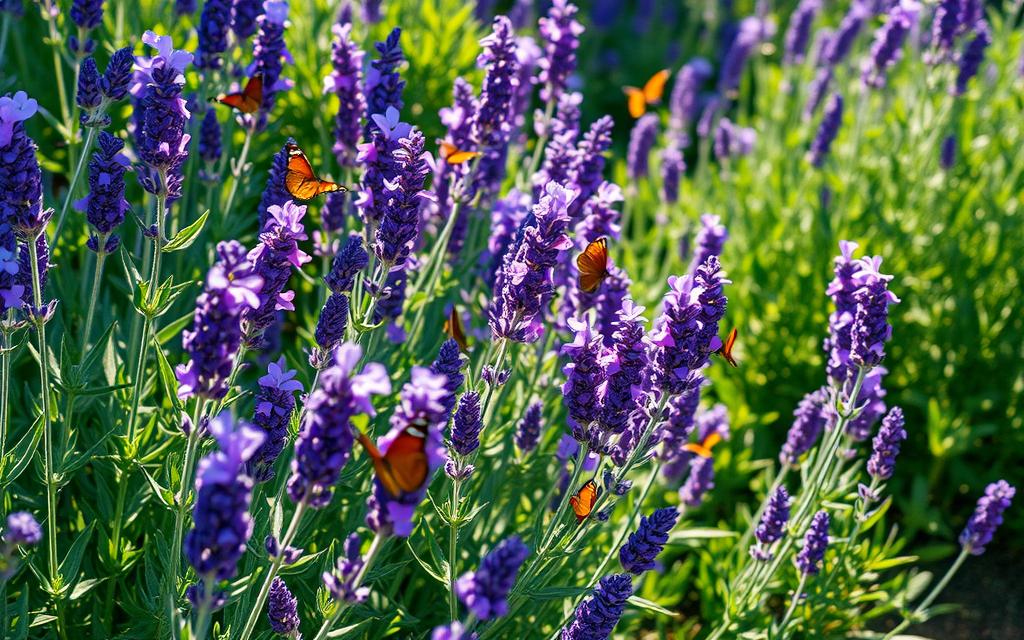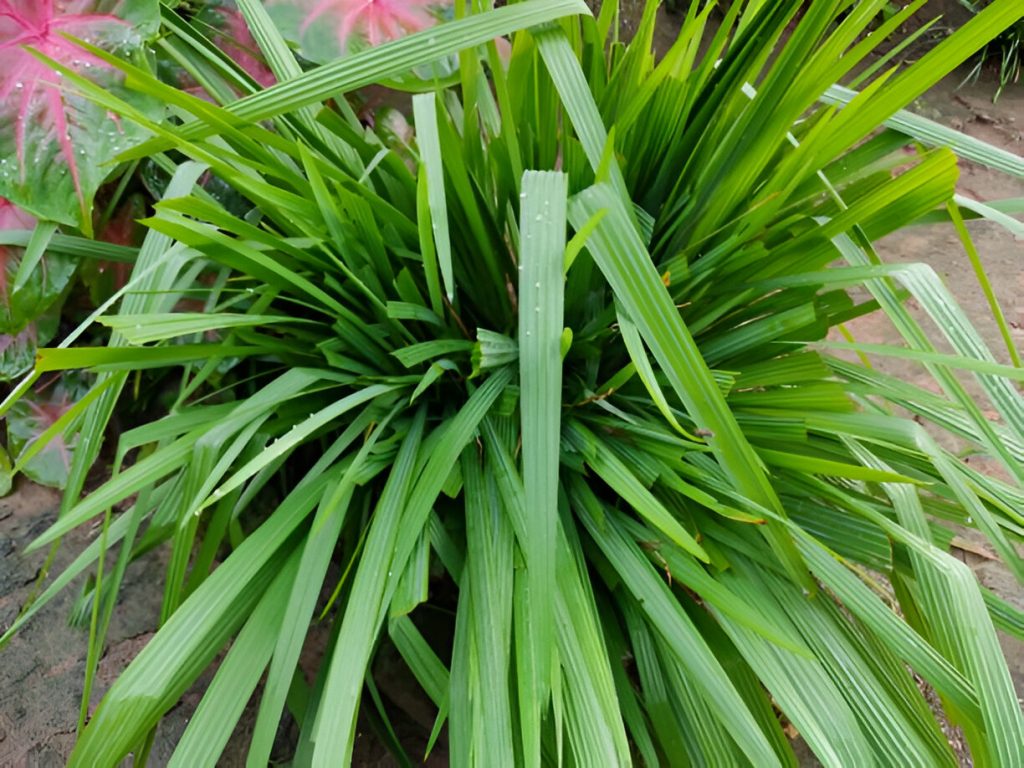Did you know some plants can keep mosquitoes away naturally? Experts say certain plants can act as a barrier against pests. By planting these around your yard, you can make a bug-free space.
These plants not only repel mosquitoes but also add color, fragrance, and even taste to your garden. They make your outdoor areas a pleasant place to be.
In this article, we’ll look at six top plants that keep mosquitoes away. From citronella’s citrus smell to lavender’s calming scent, these plants make outdoor spaces enjoyable. Say goodbye to mosquitoes and hello to peace.
What are Mosquito Repellent Plants?
Understanding the Power of Natural Repellents
Mosquito repellent plants are special plants that keep mosquitoes away. They have natural compounds and smells that mosquitoes don’t like. These plants make essential oils and fragrances that block mosquitoes from finding humans. By having these plants around, you can keep mosquitoes away without using harmful chemicals.
These plants do more than just keep mosquitoes away. They also attract bees and butterflies, give you fresh herbs, and make your garden look beautiful. Plants like citronella and lavender use their essential oils to keep mosquitoes from bothering you. This lets you enjoy your outdoor spaces more comfortably.
“Incorporating natural mosquito repellent plants into your home and garden is a practical, eco-friendly way to deter unwanted pests without exposing yourself or your family to harsh chemicals.”
Learning about these natural repellents can help you make a mosquito-free space. This space is good for you and the planet. So, let’s look at the many mosquito repellent plants that can make your outdoor areas great again.
Mosquito Repellent Plants
Nature has given us many ways to keep mosquitoes away. Plants like citronella grass, lavender, and marigolds are great at keeping them off. By adding these plants that naturally deter mosquitoes to your outdoor areas, you can enjoy your space without bugs.
Citronella grass is famous for repelling mosquitoes. Its lemon scent keeps them away, making it perfect for patios and gardens. Lavender and marigolds also work well. They have strong scents that mosquitoes don’t like.
- Citronella grass (USDA Hardiness Zones 9-11)
- Lavender (USDA Hardiness Zones 5-9)
- Marigolds (Annual)
- Catnip (USDA Hardiness Zones 3-7)
- Rosemary (USDA Hardiness Zones 8-10)
- Basil (Annual)
- Scented geraniums (USDA Hardiness Zones 10-11)
These plants are just a few examples of how to keep mosquitoes away. A garden full of these plants can make your outdoor space bug-free.

“More than one million people die every year worldwide due to mosquito-borne diseases.”
Using effective mosquito repellent plants is a natural way to fight mosquitoes. It’s good for your family and the environment. With the right plants, you can make a beautiful, mosquito-free outdoor space.
Citronella Grass: A Citrusy Deterrent
Looking for a natural way to keep mosquitoes away? Citronella grass, also known as lemongrass, is your answer. This tall, grassy plant is a top choice for keeping mosquitoes out of your outdoor spaces.
Citronella grass can grow up to 5-6 feet tall and spread 3-4 feet wide. It creates a lush, fragrant barrier against mosquitoes. When you brush against its leaves, it releases a strong citrus scent. This scent hides your scent from mosquitoes, making them less likely to bite you.
The oil from citronella grass is used in many products to repel insects. But, there’s debate about how well these products work. Studies have shown mixed results on citronella’s mosquito-repelling abilities. Still, growing citronella plants can offer a natural way to keep mosquitoes away and enjoy the outdoors.
Citronella grass loves warm, sunny spots and fits well in gardens or planters. Strategically placed, it can create a barrier to keep mosquitoes away. This lets you enjoy your backyard or patio without worrying about mosquito bites.
While citronella isn’t a perfect repellent, it’s a good natural choice for your mosquito control plan. Use it along with other methods like proper drainage, fans, and other mosquito-repelling plants like lemongrass or lavender.
Lavender: A Fragrant Ally
Lavender is a strong mosquito-repelling plant because of its strong scent. The essential oils in its leaves and flowers help hide human smells from mosquitoes. It grows well in hot, dry places and can be planted in the ground or in pots.
Crushing lavender leaves or flowers makes the scent even stronger. This helps keep mosquitoes away.
The Soothing and Protective Power of Lavender
Lavender not only keeps mosquitoes away but also has a calming effect on people. Its scent contains compounds like linalool and linalyl acetate. These help keep mosquitoes from ruining outdoor fun.
Planting lavender around your outdoor areas makes a beautiful, natural barrier against mosquitoes. This way, you can enjoy the outdoors without bugs bothering you.
Using lavender essential oil in candles and diffusers can also repel mosquitoes. This lets you enjoy the outdoors in peace. Research shows lavender essential oil is 80% effective against mosquitoes.
For a mosquito repellent spray, mix 20% lavender essential oil with 80% water. This is the best ratio for keeping mosquitoes away.
“Lavender, catnip, and citronella are highlighted as the most effective plants for repelling mosquitoes among other mosquito-repelling plants.”
Whether you grow lavender for mosquito control or enjoy its lavender mosquito repellent benefits, it’s a great choice. It helps make your outdoor space peaceful and bug-free.

Marigolds: Bright Blooms, Natural Protection
Marigolds are a favorite annual flower that brightens up gardens. They also keep mosquitoes away with their strong scent. By planting marigolds around your patio or, you can keep mosquitoes out.
Marigolds are easy to grow and thrive in many conditions. Their bright flowers last from spring until the first frost. They also keep aphids, thrips, whiteflies, and other pests away, making them great for your garden.
Studies show marigolds release chemicals that insects, including mosquitoes, find offensive. They contain Pyrethrum, found in many repellents, and Ageratum secretes coumarin, used in commercial repellents.
“Marigolds are a classic annual flower that not only add vibrant pops of color to gardens, but also serve as effective natural mosquito repellents.”
If you want a mosquito-free garden or to enjoy the outdoors without bugs, add marigolds for mosquito control. Their bright flowers and natural pest-repelling make them a smart choice for a bug-free home.
| Mosquito Repellent Plants | Effectiveness |
|---|---|
| Marigolds | Contain Pyrethrum and secrete Coumarin, compounds used in commercial repellents |
| Catmint | Scientifically proven to repel mosquitoes 10 times more effectively than DEET |
| Sage | Crushed leaves can be rubbed directly onto skin or clothing for natural repellent |
| Thyme | Crushed leaves release volatile oils that act as a natural insect repellent |
| Mint | Releases volatile oils when leaves are bruised, acting as a natural insect repellent |
By adding growing marigolds to deter mosquitoes to your garden, you get beautiful flowers and a natural barrier against pests. Marigolds are a valuable addition to any outdoor space.
Mosquito Repellent Plants
Exploring Nature’s Defense Against Biting Pests
Citronella grass, lavender, and marigolds are known to keep mosquitoes away. But, there are more plants that can help too. By adding natural mosquito repellent plants to your garden, you can make it both beautiful and bug-free.
Here are some top plants to fight off mosquitoes:
- Catnip (Nepeta cataria) – Thrives in USDA Hardiness Zones 3-7, reaching a mature size of 2–3 ft. tall and wide.
- Rosemary (Salvia rosmarinus) – Effective in USDA Hardiness Zones 8-10, growing 2–6 ft. tall and 2–4 ft. wide.
- Basil (Ocimum basilicum) – Thai basil, lemon basil, and other varieties offer potent mosquito-repelling essential oils, with a mature size of 18–24 in. tall and wide.
- Scented Geraniums (Pelargonium spp.) – Lemon-scented varieties deter mosquitoes in USDA Hardiness Zones 10-11, growing 1-3 ft. tall and 1-2 ft. wide.
These plants do more than just keep mosquitoes away. They also attract pollinators, provide herbs for cooking, and make your garden look great.
By choosing essential oil plants that deter mosquitoes, you can make your garden a welcoming space for you and a barrier against pests. With some planning, you can have a mosquito-free area that’s also full of life and color.
Companion Planting: A Symbiotic Solution
Planting individual mosquito-repellent plants is just the start. You can also use companion planting to fight mosquitoes more effectively. By grouping certain plants together, you boost their ability to keep pests away.
For instance, combining citronella grass with lavender or marigolds makes your garden even more mosquito-repellent. This method also lets you mix different plant sizes, textures, and bloom times. This makes your outdoor space look better and more complete.
Companion planting does more than just keep mosquitoes away. It also:
- Increases biodiversity and keeps the ecosystem balanced, preventing pest problems
- Improves soil health and reduces the need for chemical fertilizers
- Boosts pollination, leading to better fruit sets and higher crop yields
- Helps make the most of small spaces in gardens or cities, increasing productivity
By using companion planting for mosquito control, you create a natural and lasting solution. This keeps your yard and garden free from bugs.
“The ‘Three Sisters’ companion planting technique has been practiced for potentially over 3,000 years by Indigenous American agricultural communities.”
Planting a mix of mosquito-repelling plants in your garden is a smart way to keep mosquitoes away. With some planning and careful planting, you can have a beautiful, bug-free outdoor space.
Maintaining a Mosquito-Free Yard
To keep your yard mosquito-free, there are several steps you can take. First, eliminate standing water sources like bird baths and gutters. Mosquitoes can breed in even small amounts of water. Use mosquito dunks or rings in water features to stop larvae from growing.
Tips for Effective Mosquito Control
Keep your lawn and plants trimmed to remove breeding grounds. Remove debris and tall grass. You can also use natural mosquito repellent sprays or candles for extra protection. Combining plants with other measures creates a strong, eco-friendly defense against mosquitoes.
Here are more tips to boost your mosquito control:
- Regularly empty and clean containers, birdbaths, and other standing water sources to stop mosquito breeding.
- Use mosquito dunks or rings in ponds, fountains, and other water features to interrupt the mosquito life cycle.
- Keep your lawn and garden well-manicured, removing tall grass, weeds, and debris that can harbor mosquitoes.
- Install fans in outdoor seating areas, as mosquitoes struggle to fly in windy conditions.
- Consider using natural mosquito repellent sprays or candles made with essential oils like citronella, lemongrass, or peppermint.
By using mosquito-repellent plants and these control measures, you can keep your yard and outdoor spaces mosquito-free all season.
“Mosquitoes are not only a nuisance, but they can also transmit dangerous diseases. Taking a multi-faceted approach to mosquito control is essential for maintaining a safe and enjoyable outdoor environment.”
Conclusion
Mosquitoes can be a big problem and a health risk. But, by using mosquito-repelling plants outside, you can fight them naturally. Plants like citronella grass and lemongrass have scents that keep mosquitoes away. Lavender and marigolds also help, adding beauty and attracting pollinators.
By placing these mosquito-repellent plants around your yard, you create a safe area. This area is also beautiful and can even give you fresh herbs. Using these plants with other natural mosquito control methods makes your outdoor space safer and more fun.
It’s important to try different mosquito-repelling plants to see what works best for you. The right plants can depend on your climate and the types of mosquitoes you have. By using natural mosquito control, you can enjoy your outdoor space without mosquitoes bothering you.
FAQ
What are the most effective mosquito repellent plants?
Experts say the best plants to keep mosquitoes away include citronella grass, lavender, and marigolds. Catnip, rosemary, basil, and scented geraniums are also effective. These plants have natural oils that keep mosquitoes and other bugs away.
How do mosquito-repelling plants work?
Mosquito-repelling plants release oils that confuse mosquitoes. These oils hide human scents, making it hard for mosquitoes to find people. This creates a barrier that keeps mosquitoes away naturally.
What are the benefits of using mosquito-repellent plants?
Besides keeping mosquitoes away, these plants attract pollinators and add to your garden’s look. They also provide herbs for cooking. Plus, they’re a safe, eco-friendly way to fight mosquitoes without harsh chemicals.
How should I plant mosquito-repelling plants for maximum effectiveness?
Plant these plants around your yard’s edges for the best results. Grouping certain plants, like citronella and lavender, can make them even more effective. This is called companion planting.
What other steps can I take to maintain a mosquito-free outdoor space?
Besides planting, remove standing water and keep your lawn trimmed. Use natural sprays or candles for extra protection. These steps help keep your outdoor space mosquito-free.







